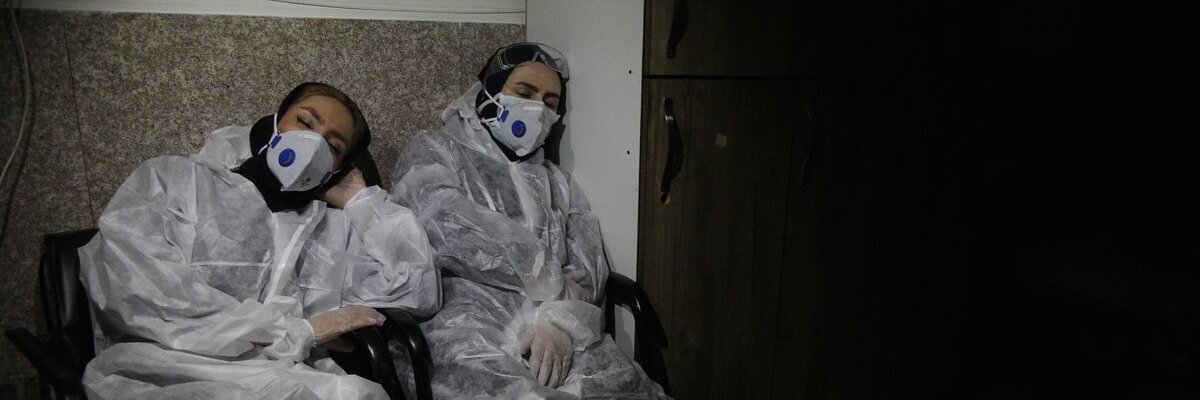Democrats Push Back on Sanctions, Citing Coronavirus Fears
By Jack Detsch
Top Democrats in Congress are urging the Trump administration to ease sanctions on Iran, Venezuela, and other countries badly hit by the coronavirus pandemic, citing the need to provide medical supplies and humanitarian support.
In a stream of several letters aimed at Secretary of State Mike Pompeo and other top U.S. officials, Democratic members of Congress including presidential candidate Sen. Bernie Sanders and Rep. Alexandria Ocasio-Cortez are pushing for the administration to grant clearly outlined waivers from American sanctions.
Democratic Sen. Chris Murphy also spearheaded a call by several Democrats to the Trump administration to ease U.S. sanctions against countries, including Iran and Venezuela, hit hard by coronavirus, saying the measures are hampering the free flow of medicines and other humanitarian supplies to the neediest as the pandemic worsens.
“Helping these nations save lives during this crisis is the right thing to do from a moral perspective, but it is also the right thing to do from a national security perspective,” Murphy wrote in the letter sent Thursday to Pompeo and Treasury Secretary Steven Mnuchin. “By allowing our sanctions to contribute to the exceptional pain and suffering brought about by the coronavirus outbreaks in both nations, we play into the anti-Americanism that is at the heart of both regimes’ hold on power.” The letter was co-signed by several Senate Democrats, including Chris Van Hollen, Tim Kaine, and Patrick Leahy.
An early draft of the letter sent by Sanders and Ocasio-Cortez that was seen by Foreign Policy also calls for a temporary suspension of sanctions, including on the banking and oil sectors that have been heavily targeted since President Donald Trump pulled the United States out of the Iran nuclear deal in May 2018. The letter is expected to be sent to Pompeo and Mnuchin early next week.
The Trump administration has said that it would only lift sanctions—which are aimed at pressuring Iran into a fresh nuclear deal without sunset provisions—once Iran stops its activity of supporting terrorist groups and proxies in the Middle East and halts its ballistic missile program. In February, the United States asked Iran to identify medical or other needs for coronavirus relief through Swiss interlocutors. State Department spokesperson Morgan Ortagus told the U.S.-funded Radio Farda on Thursday that the offer came without preconditions.
Murphy is asking the administration to hold off on the enforcement of sanctions for 90 days that could halt “a rapid humanitarian response” to the spread of the coronavirus in Iran. He also wants the Treasury Department to ease penalties against information technology companies that could provide information on treating or preventing the disease.
Over 30,000 cases of the novel coronavirus have spread across Iran, including to elite military and clerical leaders. Earlier this month, Iranian state radio said that Mohammad Mirmohammadi, a member of the advisory body to Supreme Leader Ali Khamenei, had died of COVID-19. Amid the crisis, Iran has asked the International Monetary Fund for $5 billion in critical funds and for supplies of masks, respirators, and other medical equipment.
The debate over whether to modify U.S. sanctions on Iran spilled out onto the editorial pages of major American papers this week, with the New York Times editorial board calling for the Trump administration to allow an IMF loan to move forward and for technical assistance. The Wall Street Journal’s editorial board ran a rejoinder on Wednesday.
Some experts say even with sanctions relief or waivers for humanitarian and medical supplies, it’s unclear if countries like Iran have enough foreign currency reserves to buy up medical supplies—or if foreign companies and international banks would be willing to broker the transactions in the first place. “Even if they say they’re not targeting Iran’s humanitarian imports, they’re still chilling the markets overall,” Brian O’Toole, a former CIA and Treasury Department official, told Foreign Policy.
Administration officials also believe Iran’s military and its proxies could immediately take advantage of any broader sanctions relief, even if sanctions were only eased temporarily. “If Iran could suddenly repatriate a bunch of money, or Iran’s [Islamic Revolutionary Guard Corps] funds were unfrozen, it could start to move those into places where it’s hidden, people couldn’t find them as easily, and then you’re stuck back in a place … where you’ve aided U.S. adversaries,” O’Toole said.
The call for the suspension of sanctions coincides with a Democratic effort led by Rep. Eliot Engel, the chairman of the House Foreign Affairs Committee, and Rep. Adam Smith, head of the armed services panel, to keep the U.S. Agency for International Development from halting aid to areas controlled by the Iran-backed Houthi rebels in Yemen, a suspension that’s set to go into effect on Friday.
“USAID is totally stonewalling efforts to push this suspension back, or to create meaningful carve outs for lifesaving programs,” a former U.S. official familiar with the matter told Foreign Policy.
USAID’s assistant administrator for its Bureau for Latin America and the Caribbean, John Barsa, who is set to take over the agency’s top spot in an acting role next month, strongly supports the suspension of U.S. assistance to Houthi-controlled areas, the former official said, though the Trump administration has been warned that the freeze could lack sufficient carve-outs for bystanders living under the Iran-backed group.
But it’s not clear the legislative effort to urge a course change will have an impact on the Trump administration’s efforts to exact what it calls “maximum pressure” on Iran to force it to rein in proxy groups and efforts at ballistic missile and nuclear programs.
Photo: Wikicommons




